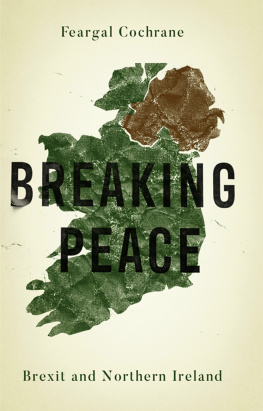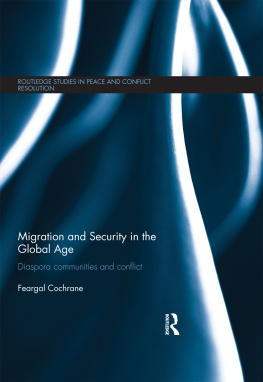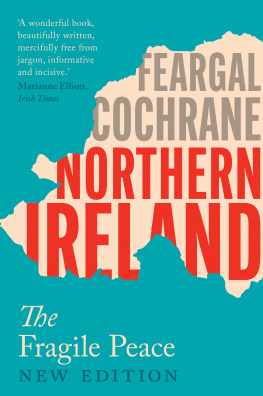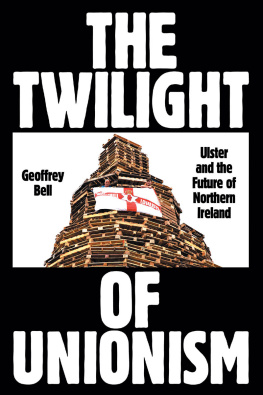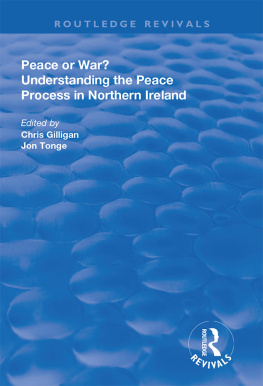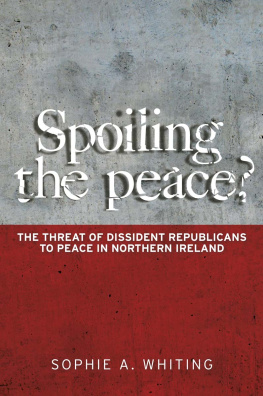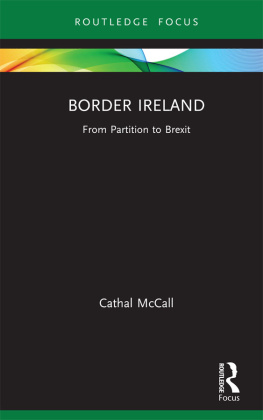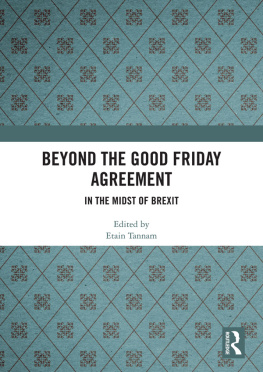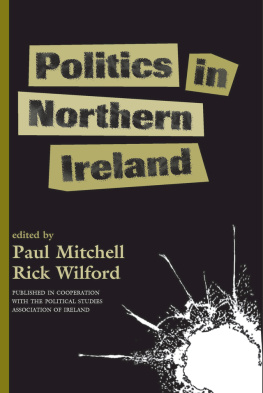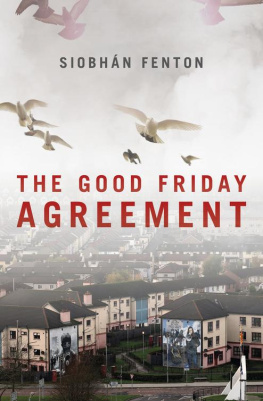Copyright Feargal Cochrane 2020
The right of Feargal Cochrane to be identified as the author of this work has been asserted by him in accordance with the Copyright, Designs and Patents Act 1988.
Published by Manchester University Press
Altrincham Street, Manchester M1 7JA
www.manchesteruniversitypress.co.uk
British Library Cataloguing-in-Publication Data
A catalogue record for this book is available from the British Library
ISBN978 1 5261 4255 9hardback
First published 2020
The publisher has no responsibility for the persistence or accuracy of URLs for any external or third-party internet websites referred to in this book, and does not guarantee that any content on such websites is, or will remain, accurate or appropriate.
Cover: Rob Pinney
Typeset
by New Best-set Typesetters Ltd
Brexit tears up the Good Friday Agreement. The DUP were against the Good Friday Agreement and this is their revenge. They want to destroy the Good Friday Agreement and have waited twenty-one years and this is their opportunity to do that. If Brexit goes ahead in the way envisaged by the DUP and the Brexiteers, then you have effectively binned the Good Friday Agreement.
Mirtn Muilleoir MLA, Sinn Fin
The damage to the Belfast Agreement and the devolved institutions has not been done by Brexit but by the absence of the Assembly sitting. It is ironic that those who are most keen on cross-border institutions are ensuring that the cross-border institutions do not meet because there is no Assembly and no Ministers to go to cross-border meetings. However, what the current situation has done is to highlight one of the very weak points of the Belfast Agreement, namely that one Party can have a veto as to whether or not the institutions of the Belfast Agreement are allowed to operate.
Sammy Wilson MP, Democratic Unionist Party
[Brexit] has fundamentally changed the constitutional settlement of the United Kingdom. We need to have a new future of how we look at the United Kingdom.
Steve Aiken MLA, Ulster Unionist Party
I think that [during] Brexit, Northern Ireland is the most polarised it has been since the Hunger Strikes in 1981. However, clearly there is nothing like the risk of violence or the appetite for violence that there was in 1981.
Ben Lowry, deputy editor, Belfast News Letter
Brexit hit Northern Ireland like a meteor from space. No one really saw it coming or really understood its implications. It represents the biggest political and economic challenge for Northern Ireland since its foundation in 1921. In 2021 we will be commemorating the centenary of the creation of Northern Ireland, but the implications of Brexit will likely shape Ireland's future (North and South) for the next hundred years. In the context of Northern Ireland's troubled history, Brexit sits as a counterpoint to partition, separated by nearly a century but bookending generations of political strife, cultural division and economic instability. Thus for a political scientist who has spent the last twenty-five years writing and teaching about the political conflict and troubled institutions in the region, it raises a fascinating and urgent set of questions for the future of Northern Ireland, relationships within the whole island and between Ireland and Great Britain (GB).
and decanted into a heady brew of ethnonational identity. The problem is that these identities are contested, and are reflected in mainly binary British and Irish terms. History is remembered (or misremembered) along divided lines, where the past is deployed in pursuit of contemporary disputes about political power and cultural belonging. Brexit encapsulates this multilayered conflict, where micro and macro issues are inextricably linked to the point where they form an amalgam. Thus the Irish border is simultaneously about a territorial demarcation and also about an existential identity crisis. Border roads that might appear sleepy backwaters are actually emotionally charged frontiers places that for some Brexit supporters have been weaponised by those on the Remain side of the argument seeking to use the Irish peace process as a shield to hide behind to guilt-trip the United Kingdom (UK) government into changing its policy. Once Brexit happened (and in Ireland Brexit happened on 24 June 2016 once the referendum outcome was known), border roads became more than roads. They became political and cultural totems of Irish freedom, peace, stability and the Belfast/Good Friday Agreement.
Brexit as an issue therefore connects the present and future of Ireland to the past in a number of ways many of them not appreciated by the government that is responsible for running the Northern part of it. The border to take one of the most immediate issues in the UK's departure from the European Union (EU) is not just a territorial demarcator, or even just a political one. It is of course both, but it is also an historical, cultural and psychological phenomenon with a resonance in the Irish context that has just not been appreciated when viewed through a British lens. So to close a border road in Ireland would have a significance beyond traffic management for either the Irish or UK governments. Such an act would be seen as an historical throwback to malign English control, to what is popularly referred to as the Troubles of the 1970s and 1980s and beyond that to the Irish Famine of the mid-nineteenth century, the Land War that followed and the rise of militant republicanism in the early twentieth century that led to the partition of Ireland in 1921 and to the very border that is once again on the front burner of contemporary Irish politics. None of this historical baggage was on the radar of those driving the Brexit project in 2016, or of those who continue to do so.
This book examines the impact of Brexit on Northern Ireland, and it is primarily concerned with the story of the negotiations and how these affected Northern Ireland and the wider set of political relationships between London and Dublin and with the European Union itself. One of the key threads that runs through the book relates to the way in which the Brexit negotiations have affected political stability in Northern Ireland and further complicated the operation of the devolved institutions, and the progress of the peace process more broadly. As the title suggests, it poses the question: Is Brexit breaking peace in Northern Ireland?
Everyone back then was looking inwards at each other rather than outwards at how changes in the external political environment might destabilise the political settlement. There was an underlying assumption within the text of the GFA that external factors would remain constant. To this extent the book presents an example for other conflict contexts about the capacity for political events to evolve and the need for negotiated agreements to build flex into their language to accommodate such unforeseen changes. As Brexit demonstrates (like the end of the Cold War before it), meteors do land on occasion and it is wise to have some shock absorbers available for fragile post-conflict political institutions when they do.
Another theme that sits at the centre of the book relates to Northern Ireland's political and cultural position within the United Kingdom and the manner in which Brexit once again thrust the region into the forefront of British politics. While Northern Ireland quickly became an issue in the Brexit negotiations, this was not the case during the UK referendum campaign in 2016. How Brexit would impact on Northern Ireland was simply not on the political radar or that of the media that was covering the campaign. This oversight became obvious after the referendum result, but the fact that it was largely overlooked beforehand raises a fundamental set of issues pertaining to Northern Ireland's role within the UK and how that is understood in both Ireland and in Great Britain.

